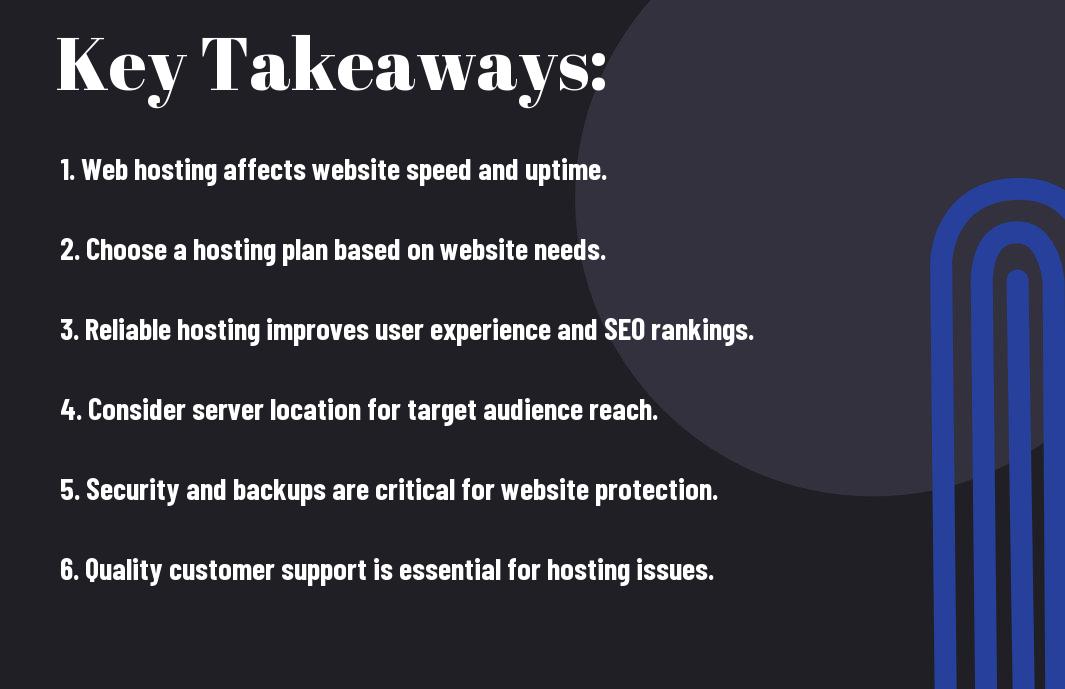When it comes to maximizing the efficiency and effectiveness of your website, web hosting plays a crucial role. Your choice of web hosting provider can have a significant impact on the performance, speed, and security of your website. It determines how quickly your web pages load, how much traffic your site can handle, and how well it can withstand cyber threats. In this blog post, we will explore the essential role of web hosting in ensuring that your website delivers a seamless and satisfying experience for your visitors. Whether you are a business owner, a blogger, or an aspiring entrepreneur, understanding the significance of web hosting is vital to the success of your online presence. So, let’s delve into the world of web hosting and discover how it can influence the overall performance of your website.
Key Takeaways:
- Web hosting directly impacts website performance: The quality of web hosting services can significantly affect a website’s speed, availability, and user experience. It’s crucial to choose a reliable and high-performing web hosting provider.
- Server location matters: The physical location of the web hosting server can impact the website’s loading speed for visitors in different regions. Choosing a server location closer to the target audience can improve performance.
- Optimization and maintenance are essential: Regular maintenance, optimization, and upgrades of web hosting resources are essential for maintaining optimal website performance. It’s important to regularly monitor and address any performance issues that may arise.

Understanding Web Hosting
Some say that web hosting is like renting space on the internet where your website, files, and data are stored. When someone types your domain name into their browser, the hosting provider delivers the files necessary to display your website. It is an essential service that allows individuals and organizations to post a website or webpage onto the Internet. Without web hosting, your website would not be accessible to anyone.
Definition and Types of Web Hosting Services
There are several types of web hosting services available, each catering to different website needs. The main types of web hosting services include shared, VPS, dedicated, cloud, and reseller hosting. Shared hosting is the most common and cost-effective option, where multiple websites share a single server. VPS hosting provides a more stable and secure hosting environment, while dedicated hosting gives you full control over the server. Cloud hosting offers flexibility and scalability, and reseller hosting allows you to sell hosting to others. The key features of each type are outlined in the table below.
| Type of Web Hosting | Key Features |
|---|---|
| Shared Hosting | Low cost, easy to use, limited resources, security limitations, slower performance |
| VPS Hosting | Dedicated resources, scalability, better performance, root access, higher cost |
| Dedicated Hosting | Full control, high performance, security, expensive, technical expertise required |
| Cloud Hosting | Scalability, flexibility, reliability, pay-as-you-go pricing, potential security risks |
| Reseller Hosting | Ability to sell hosting, white-label branding, control over pricing, support limitations |
The decision on which type of web hosting to choose will depend on your website’s size, traffic, security needs, budget, and technical expertise. The right choice can greatly impact your website’s performance and user experience.
Key Features of Web Hosting Solutions
Web hosting solutions come with a variety of key features that play a crucial role in ensuring your website’s performance and security. Some of the most important features to consider when selecting a web hosting provider include uptime, speed, security, customer support, and scalability. Uptime refers to the amount of time your website is accessible to visitors, while speed impacts user experience and search engine rankings. Security measures protect your website from cyber threats, and reliable customer support ensures your issues are addressed promptly. Scalability allows your website to handle increased traffic and data as your business grows. These features are critical for the success of your website and online presence. Though the right web hosting solution can help your business flourish, choosing the wrong one can lead to downtime, slow website loading, security breaches, and poor user experience.
Web Hosting and Website Speed
After creating your website, the next step is to find a reliable web hosting service to ensure optimal performance. The choice of web hosting provider can have a significant impact on your website’s speed, which is crucial for user experience and search engine rankings. In this chapter, we will explore the role of web hosting in website speed and how it affects your site’s performance.
The Impact of Server Response Time
One of the key factors affecting website speed is the server response time, which refers to the amount of time it takes for the web server to respond to a user’s request. When a user visits your website, their browser sends a request to the server to retrieve the necessary files to display the webpage. A longer server response time can significantly slow down the loading of your website, leading to a poor user experience. It can also negatively impact your search engine rankings, as search engines prioritize websites with faster loading times. Therefore, it is crucial to choose a web hosting provider that offers fast server response times to ensure optimal performance for your website.
Content Delivery Networks and Load Time
Another important factor that can affect your website’s speed is the use of a content delivery network (CDN). A CDN is a network of servers located across different geographical locations that store cached versions of your website’s content. When a user accesses your website, the CDN serves the content from the server that is closest to their location, reducing the load time. By leveraging a CDN, you can significantly improve your website’s speed and provide a faster, more seamless experience for your visitors. Many web hosting providers offer integrated CDN services, so you can further optimize your website’s performance without any additional hassle.
Reliability and Uptime
Despite the importance of website performance, the reliability and uptime of your website are often overlooked. However, these factors play a crucial role in ensuring that your website is consistently accessible to your visitors. The reliability of your web hosting provider directly impacts the uptime of your website, which in turn affects user experience and ultimately, your bottom line. When choosing a web hosting provider, it is essential to prioritize reliability and uptime to ensure the smooth operation of your website.
The Role of Web Hosting in Uptime
One of the key factors influencing the uptime of your website is the quality of your web hosting provider. A reliable web host will have strong infrastructure and technical support in place to ensure that your website remains accessible at all times. When evaluating web hosting options, look for providers that offer guaranteed uptime and have a track record of delivering on this promise. Additionally, consider the provider’s redundancy measures, such as backup power systems and multiple data centers, to minimize the risk of downtime.
Backup and Recovery Options
Backup and recovery options are crucial for minimizing the impact of potential downtime on your website. A reputable web hosting provider will offer regular backups of your website data, as well as recovery solutions in the event of a system failure or data loss. When selecting a web hosting plan, inquire about the provider’s backup frequency and retention policies to ensure that your website data is adequately protected. Additionally, consider the availability of automatic backup tools or the option to implement your own backup solutions.
Security and Web Hosting
Keep in mind that the security of your website is crucial for both your business and your visitors. Your choice of web hosting can greatly impact the security of your website. To learn more, you can read the article The Role Of Domain And Hosting In Website Speed to understand how domain and hosting play a role in website performance.
Protecting Against Cyber Threats
When it comes to web hosting, it’s important to protect your website against cyber threats. A reliable web hosting provider offers strong security measures such as firewalls, malware scans, and DDoS protection. These defenses are essential for safeguarding your website from potential attacks that could compromise your data and the experience of your visitors. Choosing a web hosting service that prioritizes security will give you peace of mind and ensure the safety of your website and its visitors.
Secure Sockets Layer (SSL) Certificates and Data Encryption
Another important aspect of security in web hosting is the availability of SSL certificates and data encryption. These features are essential for securing the transmission of data between your website and its visitors. With SSL, sensitive information such as credit card details, login credentials, and personal data is encrypted, making it virtually impossible for hackers to intercept and misuse. Having SSL certificates and data encryption on your website not only protects your visitors but also helps improve your search engine rankings, as search engines prioritize secure websites.
Scalability and Flexibility
To ensure the performance of your website, it is crucial that your web hosting service offers scalability and flexibility. This means that as your website grows and attracts more traffic, your hosting provider should be able to accommodate the increased demand without your site experiencing slowdowns or downtime. A lack of scalability can significantly impact your website’s performance, causing potential customers to leave your site and seek out your competitors. For more detailed insights on the impact of web hosting on website performance, you can refer to The Impact of Web Hosting on Website Performance.
Managing Traffic Surges
When your website experiences a surge in traffic, it’s essential that your web hosting service can handle the increased load without impacting your website’s performance. If your hosting is not equipped to handle these sudden spikes, your website can become slow or even crash, resulting in a poor user experience and potentially lost revenue. Ensure that your hosting provider offers scalable resources and load balancing to effectively manage traffic surges without disrupting your site.
Hosting Plans for Growing Websites
If you anticipate that your website will continue to grow, it’s crucial to select a hosting plan that can accommodate your future needs. Look for hosting providers that offer flexible hosting plans with the option to easily upgrade your resources as your website expands. This will ensure that your website’s performance remains optimal as your traffic and content increase, without the need to migrate to a new hosting service.
Choosing the Right Web Hosting Provider
Unlike choosing a pair of shoes or a new phone, selecting a web hosting provider is a decision that can have a significant impact on the performance of your website. With so many options to choose from, it’s important to carefully consider your hosting provider to ensure your website runs smoothly and efficiently.
Factors to Consider When Selecting a Host
When it comes to choosing the right web hosting provider for your website, there are several factors to take into consideration. Reliability, uptime, speed, security, customer support, and scalability are all crucial elements that you should look for in a hosting provider. You want a host that offers reliable uptime and fast page loading times to ensure that your visitors have a positive experience on your site. Additionally, security and customer support are crucial for protecting your website and addressing any issues that may arise. Scalability is also important, as you want a host that can grow with your website as it becomes more popular. Thou must carefully evaluate these factors to make an informed decision.
Understanding Your Website’s Hosting Needs
Understanding the hosting needs of your website is essential when selecting a web hosting provider. Consider the type of website you have, whether it’s a personal blog, e-commerce site, or a corporate portal. Each type of website has different requirements and it’s important to choose a host that can cater to your specific needs. Additionally, consider the amount of traffic your website receives and the amount of storage you require. By understanding your website’s hosting needs, you can make a more informed decision when choosing a web hosting provider.

Summing up the Role of Web Hosting in Website Performance
As you have learned, web hosting plays a crucial role in determining the performance of your website. The type of hosting you choose, the server location, and the provider’s reliability all impact how quickly your website loads, its uptime, and its overall user experience. By investing in high-quality web hosting that meets your website’s requirements, you can ensure that your site performs optimally, ultimately leading to better user engagement and conversion rates. Remember to regularly assess and upgrade your hosting to accommodate your growing website traffic and needs.
FAQ
Q: What is the role of web hosting in website performance?
A: Web hosting plays a crucial role in website performance as it determines the server’s speed, uptime, and overall reliability of your website.
Q: How does web hosting impact website speed?
A: The quality of web hosting directly affects website speed. A reliable hosting provider will ensure fast server response times, leading to improved website loading speeds.
Q: What is the importance of uptime in web hosting?
A: Uptime refers to the amount of time a server is operational and accessible. For optimal website performance, it is essential to have high uptime, as downtime can negatively impact user experience and SEO rankings.
Q: What are the different types of web hosting services available for website performance?
A: The main types of web hosting services include shared hosting, VPS hosting, dedicated hosting, and cloud hosting. Each type offers varying levels of performance, scalability, and reliability.
Q: How can I choose the right web hosting provider for optimal website performance?
A: When selecting a hosting provider, consider factors such as server speed, uptime guarantees, customer support, security features, and scalability options. It is important to choose a reliable provider that can support your website’s performance needs.
CATEGORY:Web Hosting

